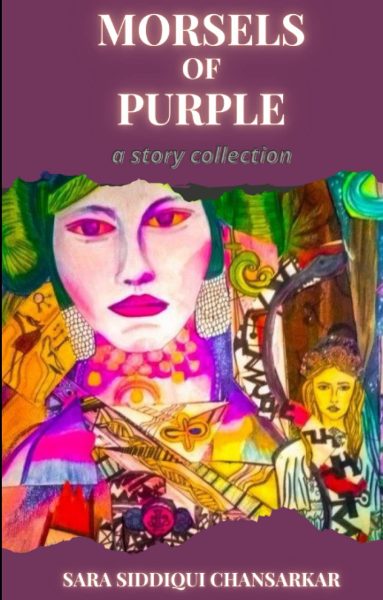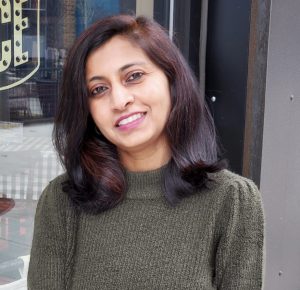
Interviewed by Helen Rye
This is a cross-cultural collection: some of the stories are very American in feel and some very Indian, both in terms of their cultural elements and settings, USA and the regions around Delhi. I really loved the intimate, day-to-day details and rhythms of the different lives portrayed here. There’s little cultural crossover within individual stories—I was wondering whether this reflected a conscious choice to keep them separate, or something else?
Great observation. It was not my intention to keep the Indian and American cultures separate. What happened was that a majority of the stories started in the setting I imagined for them and just ended there without a cultural intersection. But some stories in the collection do highlight a cultural cross-over. In The Wind Of Your Life and All That Was Me Is Gone, the main characters are Indian women who have migrated to the USA and are adapting to the American culture. In their new lives on the foreign soil, they learn a little, lose a little, or a lot.
There are quite a few stories that touch on religion, from sexual repression within a Catholic girls’ school to family tensions at Ramadan and Eid…?
Glad you asked this. About religion, I am a Muslim, educated in a convent school, married to a Hindu. Growing up, my Muslim family lived in a house that shared walls with a Hindu family on one side and a Christian household on the other. That is how religions thrived and co-existed in India, back in the day. Through my diverse background, I’ve had an opportunity to observe certain nuances in different religions. I narrate those in my stories. That said, I am not an authority on any religion and consider it to be a personal choice and way of life. The stories Bad Fish, Black Sheep and I Don’t Understand Why touch upon religion.
There are a lot of cars in this collection! What’s the story there?
Working full-time along with running a family and kitchen, I don’t have a lot of time dedicated to writing. Many stories have been conceived on my drive to and from work, and hence the cars. Baby On Board was inspired by a sticker on the car in front of me. This, Your Life came into being when I was switching between the seat settings D1 and D2 in my car.
Most of the stories are told in the first-person present tense. I wondered what it is about this particular voice that appeals to you?
Full disclosure: I don’t have a degree in English or Creative Writing. I don’t think about the technicalities of writing unless someone mentions them to me. I guess the first-person present tense comes to me naturally and effortlessly and I go with it. Some stories in the collection have POVs other than the first person. That Was Then and For A Chocolate Bar are narrated in the third person. The Rotting is first-person, but the narrator is a house.
I loved your choice of a house-narrator in that story! Food is an ever-present element across the stories, its preparation and the significance of its provision within a relationship. What has food meant to you in your life? Is there a story here that particularly reflects this?
Growing up, my mother was always cooking meals—chopping onions, washing meat and vegetables, stirring pots of curry, rolling out heaps of rotis. That’s how it is for women in patriarchal families in India. My mother kept me and my sisters away from the kitchen so we could focus on studies and not be dependent on our husbands all our lives. I never learned to cook because in India, if you can afford to pay, you can have someone cook for you. But then, my husband and I with our son migrated to the USA. And I ended up calling my mother for recipes of Indian food because I craved the dishes I grew up eating. Now, I spend a lot of time in the kitchen and that’s why most if not all of my stories have mentions of food. There isn’t a particular story that depicts the significance of food in my life but some stories like Carrot Curse and Rolling Sweat have food as the central theme.
There’s a strong and moving theme throughout of loss and disappointed hopes of family: broken relationships, lost chances at parenthood, lost older children, even through to adulthood. I read somewhere that as writers we all keep trying to tell the same stories in different ways; I wondered which of these stories comes closest to capturing this theme for you?
Your questions are so thoughtful that they force me to think in a broader way. At the risk of sounding presumptuous and all-knowledgeable, I think these things are important to most of us: God, food, relationship, loss. Though loss is universal, everyone experiences it in their unique way. Writing is a medium through which writers let the words soak the pain and disappointment, hoping that someone will find relief in them. Dear Abu, which I wrote after my father’s death, captures the pain that follows the loss of a parent.
Tell us about the title!
The stories are small, bite-sized—Morsels. But, why purple? Purple, among other things, symbolizes women, gender equality, and dignity. It is one of the colors of International Women’s Day. Because all my stories have women as the main characters, I named the collection Morsels of Purple.
__________________________
 Sara Siddiqui Chansarkar is an Indian American writer. Her work has appeared or is forthcoming in SmokeLong Quarterly, Reflex Press, Flash Fiction Online, and elsewhere. Her work has been highly commended in National Flash Fiction Day Microfiction Competition, earned an honorable mention in Flash Fiction Magazine Editor’s Choice Award, and shortlisted in the SmokeLong Quarterly Grand Micro Contest. She has been nominated multiple times for Pushcart and Best of the Net awards. She is currently an editor at Janus Literary. More at https://saraspunyfingers.com. Reach her @PunyFingers
Sara Siddiqui Chansarkar is an Indian American writer. Her work has appeared or is forthcoming in SmokeLong Quarterly, Reflex Press, Flash Fiction Online, and elsewhere. Her work has been highly commended in National Flash Fiction Day Microfiction Competition, earned an honorable mention in Flash Fiction Magazine Editor’s Choice Award, and shortlisted in the SmokeLong Quarterly Grand Micro Contest. She has been nominated multiple times for Pushcart and Best of the Net awards. She is currently an editor at Janus Literary. More at https://saraspunyfingers.com. Reach her @PunyFingers
 Helen Rye lives in Norwich, UK. She has won the Bath Flash Fiction Award, the Reflex Fiction contest and third place in the Bristol Short Story Prize. Her stories appear in The Best Small Fictions 2020 and have been shortlisted for the Bridport Prize, nominated for The Pushcart Prize and published in many journals and anthologies. She is currently studying part time for an MA in Prose Fiction at the University of East Anglia, where she is the 2019/20 Annabel Abbs Scholar.
Helen Rye lives in Norwich, UK. She has won the Bath Flash Fiction Award, the Reflex Fiction contest and third place in the Bristol Short Story Prize. Her stories appear in The Best Small Fictions 2020 and have been shortlisted for the Bridport Prize, nominated for The Pushcart Prize and published in many journals and anthologies. She is currently studying part time for an MA in Prose Fiction at the University of East Anglia, where she is the 2019/20 Annabel Abbs Scholar.

 The core workshop of SmokeLong Fitness is all in writing, so you can take part from anywhere at anytime. We are excited about creating a supportive, consistent and structured environment for flash writers to work on their craft in a community. We are thrilled and proud to say that our workshop participants have won, placed, or been listed in every major flash competition. Community works.
The core workshop of SmokeLong Fitness is all in writing, so you can take part from anywhere at anytime. We are excited about creating a supportive, consistent and structured environment for flash writers to work on their craft in a community. We are thrilled and proud to say that our workshop participants have won, placed, or been listed in every major flash competition. Community works.